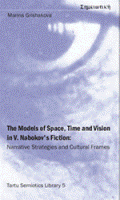Conclusion
Conclusion
Author(s): Marina GrishakovaSubject(s): Semiotics / Semiology
Published by: Tartu Ülikooli Kirjastus
Summary/Abstract: The aim of the present study was to explore the ways in which the categories of poetics, i.e. fictional time, space and point of view construction, are related to cultural encoding and the artistic practices of the modernist and postmodernist age. Whereas classical narratology, employing the ready-made “container” metaphor, often defined the narrative as the representation of events in time and space, my purpose was to use the developments of postclassical narratology and to show that time, space and point of view are themselves complex constructions, emerging as a result of both the author’s individual sensibility and cultural factors. Time and space may be described as either physical containers of action or innate categories of consciousness or, finally, as a result of human activity in the world. In the latter case, the construction of fictional worlds is only part of a broader experience of orientation and working hypotheses about “reality”, which was for Nabokov “an infinite succession of steps, levels of perception, false bottoms, and unquenchable, unattainable” (SO, 10–11).
Journal: Tartu Semiotics Library
- Issue Year: 2006
- Issue No: 05
- Page Range: 282-286
- Page Count: 2
- Language: English

